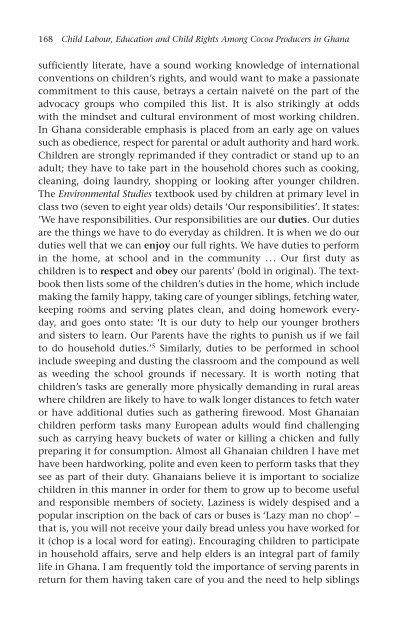3071-The political economy of new slavery
3071-The political economy of new slavery
3071-The political economy of new slavery
You also want an ePaper? Increase the reach of your titles
YUMPU automatically turns print PDFs into web optimized ePapers that Google loves.
168 Child Labour, Education and Child Rights Among Cocoa Producers in Ghana<br />
sufficiently literate, have a sound working knowledge <strong>of</strong> international<br />
conventions on children’s rights, and would want to make a passionate<br />
commitment to this cause, betrays a certain naiveté on the part <strong>of</strong> the<br />
advocacy groups who compiled this list. It is also strikingly at odds<br />
with the mindset and cultural environment <strong>of</strong> most working children.<br />
In Ghana considerable emphasis is placed from an early age on values<br />
such as obedience, respect for parental or adult authority and hard work.<br />
Children are strongly reprimanded if they contradict or stand up to an<br />
adult; they have to take part in the household chores such as cooking,<br />
cleaning, doing laundry, shopping or looking after younger children.<br />
<strong>The</strong> Environmental Studies textbook used by children at primary level in<br />
class two (seven to eight year olds) details ‘Our responsibilities’. It states:<br />
’We have responsibilities. Our responsibilities are our duties. Our duties<br />
are the things we have to do everyday as children. It is when we do our<br />
duties well that we can enjoy our full rights. We have duties to perform<br />
in the home, at school and in the community ... Our first duty as<br />
children is to respect and obey our parents’ (bold in original). <strong>The</strong> textbook<br />
then lists some <strong>of</strong> the children’s duties in the home, which include<br />
making the family happy, taking care <strong>of</strong> younger siblings, fetching water,<br />
keeping rooms and serving plates clean, and doing homework everyday,<br />
and goes onto state: ‘It is our duty to help our younger brothers<br />
and sisters to learn. Our Parents have the rights to punish us if we fail<br />
to do household duties.’ 5 Similarly, duties to be performed in school<br />
include sweeping and dusting the classroom and the compound as well<br />
as weeding the school grounds if necessary. It is worth noting that<br />
children’s tasks are generally more physically demanding in rural areas<br />
where children are likely to have to walk longer distances to fetch water<br />
or have additional duties such as gathering firewood. Most Ghanaian<br />
children perform tasks many European adults would find challenging<br />
such as carrying heavy buckets <strong>of</strong> water or killing a chicken and fully<br />
preparing it for consumption. Almost all Ghanaian children I have met<br />
have been hardworking, polite and even keen to perform tasks that they<br />
see as part <strong>of</strong> their duty. Ghanaians believe it is important to socialize<br />
children in this manner in order for them to grow up to become useful<br />
and responsible members <strong>of</strong> society. Laziness is widely despised and a<br />
popular inscription on the back <strong>of</strong> cars or buses is ‘Lazy man no chop’ –<br />
that is, you will not receive your daily bread unless you have worked for<br />
it (chop is a local word for eating). Encouraging children to participate<br />
in household affairs, serve and help elders is an integral part <strong>of</strong> family<br />
life in Ghana. I am frequently told the importance <strong>of</strong> serving parents in<br />
return for them having taken care <strong>of</strong> you and the need to help siblings


